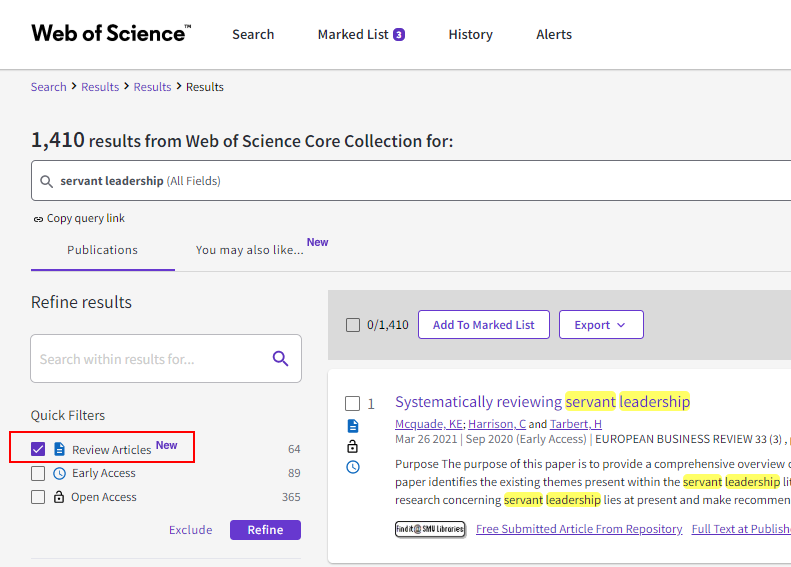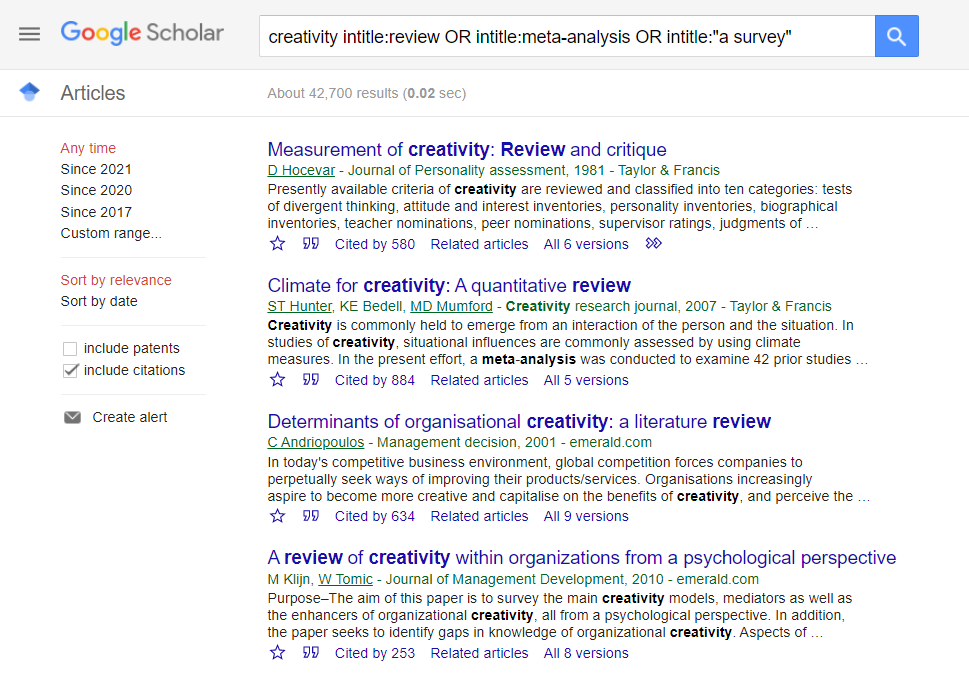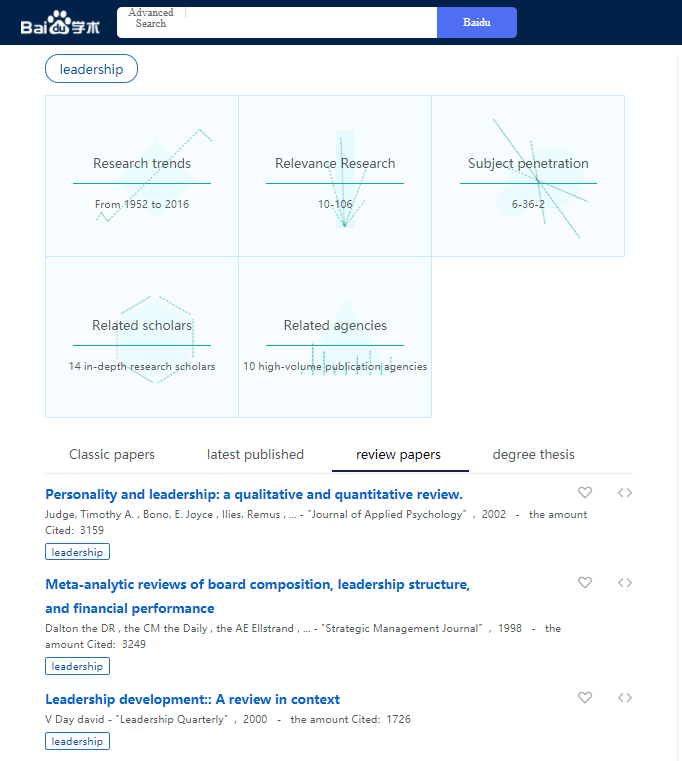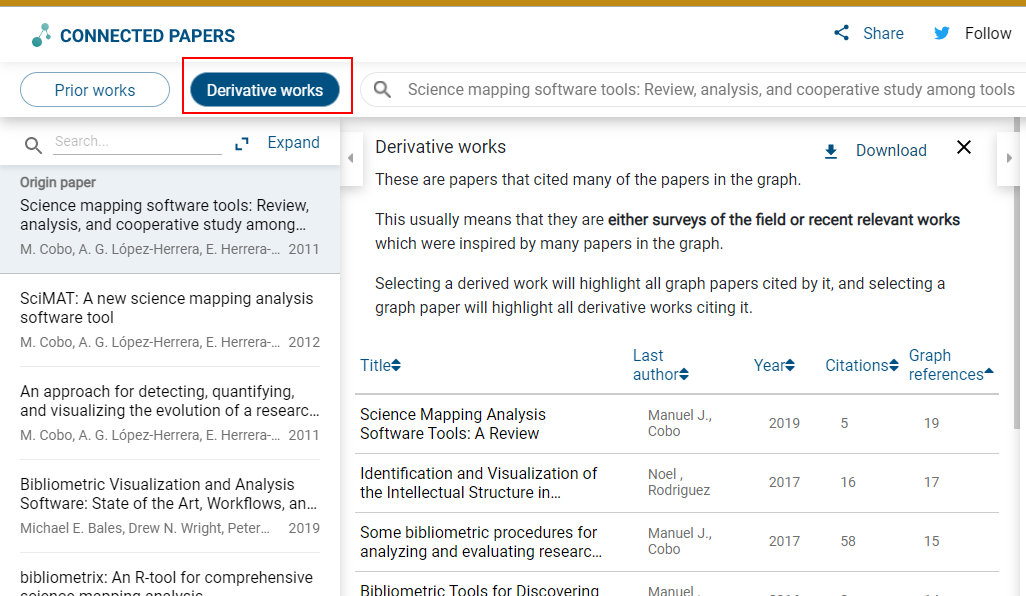
By Aaron Tay, Lead, Data Services
Getting into a new research topic and unsure where to start? Wouldn’t it be great if there was a good map of the literature done by someone already, waiting for you to refer to? Indeed, there are many rich sources that you can consider using to kick start your literature review.
These include
- Review & survey articles – e.g., Servant leadership: A review and synthesis
- Systematic reviews - e.g., A systematic literature review of servant leadership theory in organisational contexts
- Meta-analysis - e.g., Do ethical, authentic, and servant leadership explain variance above and beyond transformational leadership? A meta-analysis
- PhD and Masters Theses- e.g., Servant leadership: A literature review and reflection
But such items are not easily found; how do you find them? As dissertations and theses are relatively easily found these days, I will focus more on the first three article or document types.
#1 Search in a database with an appropriate filter
For some databases it is as simple as typing in a general keyword and choosing the appropriate filter. Alternatively in some databases you can go to advanced search to preselect the document type you want to see.

Some of these databases include
- Web of Science - use the “Review Article” filter
- Scopus - use the “Document type – Review“ filter
- Semantic Scholar - use the “Publication Type - Review or Meta Analysis”
- Pubmed - use the “Article type – Review, Systematic Review or Meta-analysis”
- Psycinfo - use the “Methodology - Literature review, systematic review, meta analysis, metasynthesis”
- ProQuest Research Library - use “Document Type: Literature review”
- [New as of Jan 2022] Google Scholar - use “Review Articles” filter
- [New as of Jan 2024] Default SMU Library search (Primo) - Use “Review Articles” filter
For some databases like ERIC, the Educational Resources Information Center which is good for education literature, you can use the thesaurus which has subjects like Literature Reviews, combine that with your topic and you can do a search for literature reviews.
The first three in the list are good for cross-disciplinary searches, while the remaining are discipline specific. Please consult your research librarian if you need more specific advice.
#2 Keyword searching in Google Scholar
Unfortunately, not every academic database provides an easy way to filter to reviews or systematic reviews. A particularly important one is Google Scholar, which is generally recognised as the single biggest sources of academic content but does not seem to have a filter for this type of content.
[New as of Jan 2022] Google Scholar now has a “Review Articles” filter! You can use the built-in filter or continue to use the search based method below which gives different results and may give trade-offs in terms of precision and recall of the results.
How then does one search for reviews in Google Scholar? One can simulate a filter by crafting a suitable search strategy for this.
Assuming for example the topic of interest is creativity, you can do a search like this
< creativity review OR meta-analysis OR "a survey" > in Google Scholar.
This generally works because most reviews, systematic reviews or meta-analysis would typically have those terms in the title and Google Scholar tends to prioritize matching keywords in the title, resulting in finding what you need in the top few results.
However, if you find that Google Scholar is generally giving you irrelevant results you can tighten up the search by restricting keywords to be matched in the title with the <intitle:> command.
Try
< creativity intitle:review OR intitle:meta-analysis OR intitle:"a survey"> in Google Scholar

In China, and lacking access to Google Scholar?
Use Baidu Xueshu (百度学术) / Baidu Academic or Scholar which is their answer to Google Scholar to automatically find review papers with their analysis function.

#3 Use Citation mapping tools like Connected Papers and 2Dsearch search to find reviews
If the above tools are still not sufficient, you can try using Connected Papers, which we covered in an earlier Research Radar piece.
What was not mentioned in the piece was that Connected Papers can not only generate a map of related paper from one relevant “seed” paper, it can also attempt to find review papers with the “Derivative Works” function that attempts to “find surveys of the field or recent relevant works which were inspired by many papers in the graph”

While this doesn’t always work, it is worth a try.
Finally, if all else fails, you can try using the method I outlined in this medium post which use a saved search strategy in 2D search to query Lens.org. You do not need to fully understand the complex search strategy I have constructed, simply change the topic box that has the word “Creativity” with your topic and run the search.
What next?
Once you have located review papers, systematic reviews etc, the sky’s the limit. You can mine the literature review for useful references of course. But review papers are often a magnet for citations and as such you can also find newer relevant papers by doing citation searching.
By now you will no doubt have more than enough relevant literature to read, but if you need more you can use them as “seed papers” in the literature mapping tools we introduced in past Research Radar pieces like Connected Papers, Inciteful. Litmaps or ResearchRabbit to find even more relevant papers!